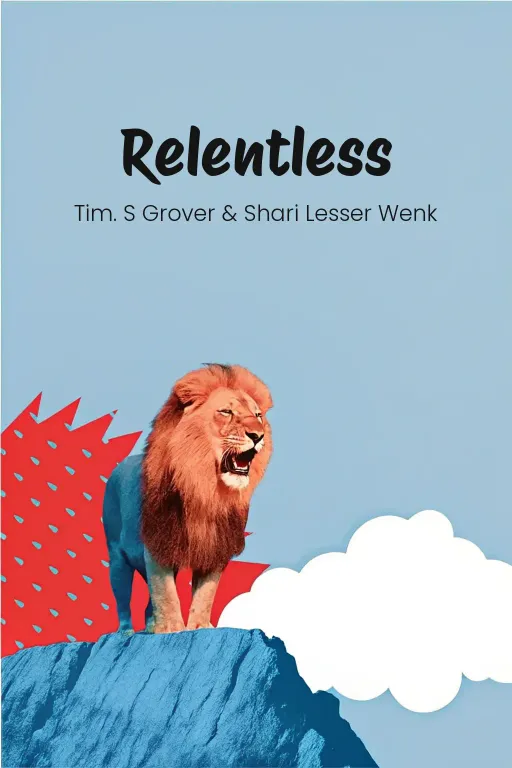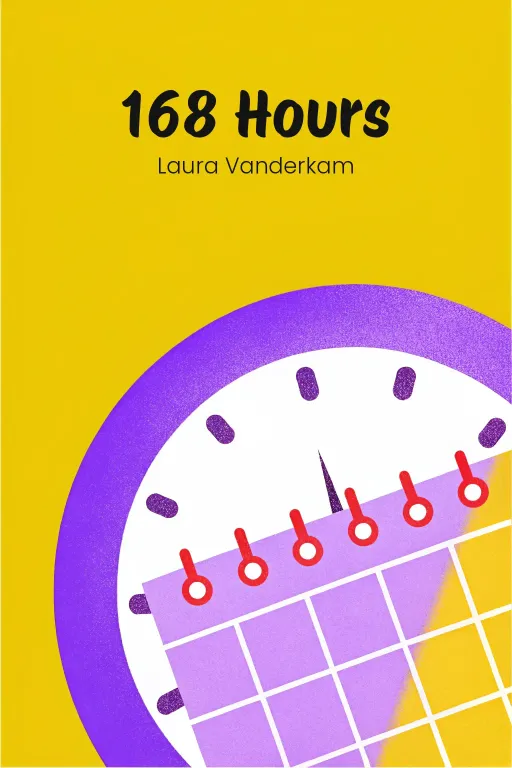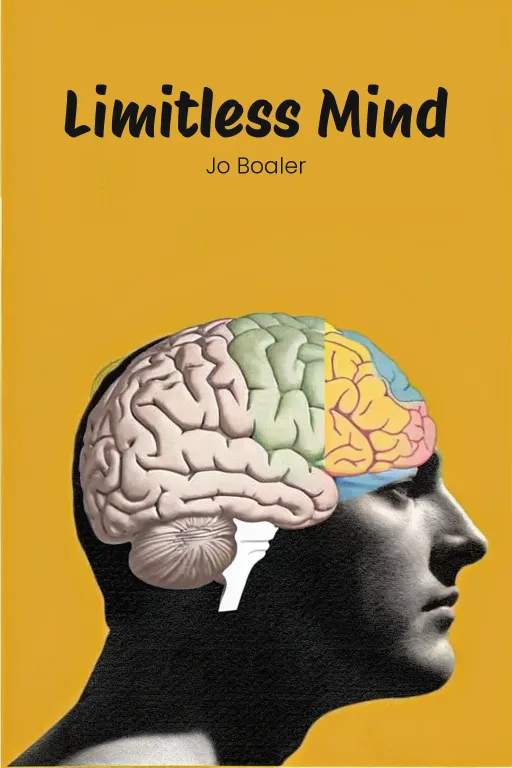
Unstoppable: Own Your Game
Podcast by Beta You with Alex and Michelle
From Good to Great to Unstoppable
Unstoppable: Own Your Game
Part 1
Alex: Alright, welcome back to the show! Today, we're diving deep into the minds of those truly unstoppable people. You know, the ones who don't just aim for success, but actually “embody” excellence in everything they do. Michelle: Exactly! We're talking about the kind of people who don't just want the ball in their hands with five seconds left on the clock, they “demand” it. Like Michael Jordan, Kobe Bryant… those athletes who just make the impossible look like part of the routine. Alex: Precisely! And a lot of that unstoppable mindset comes from Tim Grover's book, “Relentless”. He outlines three types of performers: Coolers, Closers, and Cleaners. And Cleaners, Michelle, they’re the top of the top, right? They chase greatness with this unshakable focus and they're not afraid to face discomfort head-on. Michelle: So basically, we're talking about the people who are waking up at four in the morning to train while the rest of us are still hitting the snooze button for an extra 10 minutes more times than we'd like to admit. Alex: Well, yes, but it goes deeper than that. Cleaners don't just work hard - they think differently. They trust their instincts, they adapt under pressure, and they own their results, no excuses. Grover illustrates what this mindset looks like through these incredible stories of elite athletes like Jordan and Bryant, showing how they weren't just naturally talented, but relentlessly disciplined at pushing their limits. Michelle: Right, right, but here's the million-dollar question: how do the rest of us, the mere mortals, even capture a “fraction” of that mentality? I mean, I don't think most of us are dunking basketballs during the day and then closing billion-dollar deals at night. Alex: And “that's” exactly what we’re going to explore today! We're breaking it down into three core areas: First, the foundational philosophy behind this whole relentless mindset - what makes these Cleaners so unique in how they think and how they act. Second, the distinct traits and habits that set Cleaners apart, from their unyielding accountability to their drive to actually make discomfort their ally. And finally, we're going to connect the dots to show how these principles can extend beyond sports – into whatever field you're passionate about. What do you think? Michelle: Okay, so it's like "Cleaner 101" for everyday life, whether you're leading a company, running a marathon, or just trying to survive the daily grind and not lose your sanity. Alex: Exactly! Let's unpack what it takes to go from good to great to unstoppable, and how you can start building that momentum, like, today. Michelle: Alright. Let's see what Grover's famed playbook can teach us – and whether or not it’s pure inspiration or just plain insanity. Only one way to find out.
The Cleaner Mindset
Part 2
Alex: Alright, let's dive straight into the Cleaner mindset. It's really about being relentless, not just in what you do, but in “how” you think. Think about guys like Michael Jordan and Kobe Bryant – it wasn't just natural talent; they trained their minds to perform under immense pressure, to push through discomfort, and to constantly adapt. It’s a cultivated skill set that anyone can develop, really. Michelle: Okay, so it’s more about "mental toughness" than just being naturally gifted, right? So, what would you say is the real cornerstone of this "Cleaner" mentality? Alex: It boils down to “embracing pressure”. Cleaners don't shy away from it; they see it as an opportunity to rise to the occasion. Think about Michael Jordan's "Flu Game" in '97. He was “physically” wrecked, but he still put up 38 points and led the Bulls to victory. Michelle: I remember that game! He looked like he was about to collapse at any moment. But is that level of performance grit, or just sheer, unadulterated stubbornness? Alex: It wasn't just stubbornness; it was mental mastery. Jordan had such deep trust in his preparation and instincts that his mind took over. He saw being sick as just another obstacle to overcome. Michelle: Sounds like taking "mind over matter" to the absolute extreme. Is it promoting potentially unhealthy extremes? I mean, let’s be real, performing at MJ levels while battling the flu isn't practical for most people, is it? Alex: Good point. It's not about pushing yourself until you break. It's about changing your relationship with pressure. Most of us see pressure as a threat, something to avoid. But Cleaners flip that; they see a catalyst for growth where they can sharpen their focus and really show what they're capable of. Michelle: So, if pressure throws you off, you're not even in the same league. But practically speaking, how do you prepare for that? You can't just decide to be cool with chaos one day, can you? Alex: No, definitely not. It starts with preparation. Kobe Bryant is a great example. He didn't just practice more than everyone else; he built such a solid foundation that he could rely on his instincts under pressure. Michelle: Ah, the infamous 4 a.m. workouts! The guy practically lived at the gym. Alex: Exactly! He trained to engrain skills into muscle memory, visualizing all game scenarios, tough shots, defensive setups. That level of repetition meant that, come game time, there was no hesitation, no overthinking, just instinct built on preparation. Michelle: Okay, let's bring this back to reality. Not everyone has hours to visualize imaginary basketball defenses. How does this translate if you're trying to apply this mindset at work with a high-stakes project? Alex: Good question. It's about creating habits that let you trust your instincts. For a complex presentation, for example, rehearse scenarios – what if the audience challenges your data? What if the tech fails? Like Kobe prepping for any game scenario, you're training yourself to adapt under pressure. Michelle: Preparation that anticipates chaos, rather than pretending it won't happen. Got it. But there's also this relationship with discomfort. Cleaners don't just tolerate tough situations; they seem to thrive in them. Alex: Exactly. Grover emphasizes that discomfort isn't a punishment, but a prerequisite for growth. When his basketball career ended due to injury, he rechanneled his knowledge into training athletes, eventually working with Jordan and Bryant. That shift didn't come easy; he had to face hard truths, reshape his aspirations, and just take some losses along the way. Michelle: So, discomfort was his reset button. Playing devil’s advocate though, is all discomfort valuable? How do you tell the difference between productive struggle and just banging your head against the wall? Alex: That’s a very good question! Valuable discomfort pushes you toward growth; it’s not just about suffering for the sake of it. It's about aligning that discomfort with your goals to make yourself unbeatable Think of Jordan adapting the "Jordan Rules." Instead of complaining, he adapted. Michelle: Essentially, discomfort forces evolution. What’s interesting is the element of adaptability with these Cleaners. It's one thing to cope with the discomfort, but they constantly recalibrate. Alex: You’re exactly right. Jordan’s weight training wasn’t just about overcoming the Pistons; it was about future-proofing his game. Cleaners don’t just stop; they continually ask what’s next? Adaptability is the unsung hero of the Cleaner mindset. Michelle: And that’s where most people get stuck. They have one breakthrough, but stay still instead of evolving. But Cleaners, meanwhile, are already planning their next act. Alex: This is the beauty of the Cleaner philosophy, it's not really a destination; it's a way of being. They stay dynamic and adjust their approach along the way. Michelle: Okay, so let me recap. Cleaners thrive under pressure, master their instincts through intense preparation, embrace discomfort, and stay adaptable, ready to shift when reality changes. Alex: Precisely! And those principles of embracing pressure, preparing relentlessly, reframing discomfort, and staying adaptable, are universal tools for excellence in any field. Michelle: That sounds like mental boot camp—a little intimidating, frankly. But I can see how even small steps toward that mindset could really make a difference. Alex: Absolutely. That's where we'll start: breaking it down, step by step, so anyone can take these lessons and use them in their daily lives.
Traits That Define Cleaners
Part 3
Alex: So, understanding this Cleaner mindset naturally flows into exploring the specific traits that define these individuals , how they maintain their edge. We’re building on the foundation we’ve established to really detail the characteristics that allow Cleaners to excel , bridging theory and practice here. Let’s start with one of the most critical traits: unwavering focus—that drive to conquer. Michelle: Okay, Alex, let’s unpack this. We’ve all “heard” that focus is important, right? But what makes the Cleaner’s focus different? What separates it from, say, the average person who manages to stay locked in on their work for a whole afternoon? Alex: That's a really insightful question, Michelle. It's the relentless aspect of their focus. For Cleaners, focus isn’t just about sticking to a task until it’s done—it’s about redefining obstacles as opportunities. It's about maintaining a forward momentum that simply does not waver... no matter what the circumstances throw at them. Their focus is so intense that success isn’t viewed as a finish line, it’s like... merely a checkpoint on this endless path of improvement. Michelle: So, we’re not talking celebrating wins so much as... blowing right past them, huh? Alex: Exactly. Think about Michael Jordan during his legendary battles with the Detroit Pistons and their infamous “Jordan Rules.” The Pistons basically created a defensive system designed specifically to shut him down— both physically and mentally. Now, most players would have been demoralized by that, right? Maybe even rattled. But not Jordan. He didn’t treat this as a setback. Instead, he chose to adapt, going through an intense, targeted training regimen to bulk up. It was all to counter their tactics. For Jordan, those challenges didn’t block his path; they actually became stepping stones. Michelle: Wow, that’s next-level resilience, Alex. But let me play devil's advocate for a second. How much of that focus do you think is really teachable? I mean, someone like Jordan didn’t just show up with extraordinary discipline; wasn’t a big part of that just who he already was? Alex: That's a fair point. Jordan did have a natural competitive edge, absolutely. But the thing is, Cleaners aren’t just born; they’re made. Discipline like his is cultivated over time. It’s about building habits and creating mental systems that reinforce that kind of focus. Think of it this way: when someone learns to prioritize improvement over comfort, they're essentially training their brain to operate on that Cleaner wavelength. Jordan’s obsessive commitment didn’t just happen overnight—it came from years of consciously pushing his limits. Michelle: So focus is like a muscle, something you exercise. But if we're sticking with Jordan for a moment, all that focus still needed an on-the-spot element, you know? A readiness to react without overthinking. Which, I guess, brings us to instinct, right? Alex: Yes, exactly! Mastery of instincts is another defining trait of Cleaners. A Cleaner doesn’t just trust their instincts - they've honed them so thoroughly that in those critical moments, actions just flow seamlessly. This is where Kobe Bryant becomes a textbook example. Michelle: Ah, the Mamba Mentality—can't really talk about instincts without bringing that up. So tell me, Alex, what made Kobe so instinctual on the court? Alex: Simple: preparation. Kobe’s instincts were essentially the product of relentless, granular preparation. Before every game, he immersed himself in intense visualization exercises. So by the time he actually walked onto the court, he’d already played through countless scenarios in his mind. That’s why, in moments of chaos, like facing a blitz defense in the final seconds of a game, he didn’t hesitate. He just let his instincts take over and, boom, sank the game-winning shot. Michelle: So, his brain was basically on autopilot—but the kind of autopilot you can only afford when you’ve logged the hours. That sounds amazing, but also... well, exhausting! Is it realistic to think everyone can train their instincts that way? Alex: Okay, not everyone has Kobe’s level of dedication, granted, but the underlying principle is absolutely transferable. Think of it in terms of preparation and habits. So, for example, if you're a surgeon, practicing procedures repeatedly in controlled environments really helps you act decisively in those high-pressure scenarios. Or if you’re in sales, running through pitches and objections prepares you for client negotiations. The key is intentional, purposeful preparation. That way, you can act instinctively when the pressure's really on. Michelle: It’s like programming yourself for success in advance. But let’s take instincts one step further. Being hyper-prepared is one thing—but Cleaners seem to kick into an even higher gear when it matters most. That whole idea of entering "The Zone"—where does that fit into their arsenal? Alex: Ah, “The Zone”—that's where Cleaners really separate themselves. It’s that state of peak performance where everything aligns—focus, instincts, preparation—and they just execute with complete clarity under immense pressure. It's not luck, it's not mysticism; it’s the result of total immersion in their craft. Michelle: And once again, Michael Jordan’s “Flu Game” springs to mind, doesn’t it? Alex: Exactly! That game in 1997 is a masterclass in operating within The Zone. I mean, despite being physically debilitated - he was dehydrated, feverish, clearly struggling—Jordan’s mental sharpness remained completely untouched. He scored 38 points, pushed through his physical limits and ultimately led the Bulls to victory. That is The Zone - it's complete immersion in the task at hand, not allowing any distractions, even extreme ones like illness, to pull you out. Michelle: It sounds incredible, but here's my question: is this Zone thing exclusively reserved for moments of extreme pressure, or can the "average person" tap into it for, say, a big work presentation, or a decisive moment in their career? Alex: Absolutely, anyone can access their version of The Zone, Michelle, but it requires deliberate effort. Consistent practice, preparation, unwavering focus help you eliminate distractions and just increase clarity over time. For instance, if you’ve practiced a pitch or trained for a marathon with enough determination, your mind and body can execute in sync during the critical moment, right? You’re essentially training yourself to enter The Zone when it matters most. Michelle: Alright, preparation, instincts, and handling pressure—it all sounds great so far. But let's talk about this wild card that Grover calls the "dark side." Because that's where things get… well, a little murky. Alex: The "dark side" is definitely an intriguing aspect of the Cleaner mindset. At its core, it’s about harnessing your raw, untamed ambition—the part of you that's driven by competitiveness, hunger for greatness, or even… anger. A Cleaner doesn’t suppress those feelings; instead, they channel them productively. Michelle: Let me guess—Kobe Bryant fits in here again? Alex: Absolutely. Kobe’s “Mamba Mentality” was totally fueled by his inner drive to dominate, wasn't it? He didn’t apologize for wanting to be the best; he used that ambition as fuel. Even decisions like playing through that finger injury reflected this mentality, he adjusted his game rather than stepping back. That "dark side" desire to control his destiny, even under suboptimal conditions, is what made him unstoppable. Michelle: So, the dark side is about leaning into that ambition instead of sugarcoating it? Okay, but… where's the line? When does that ambition risk turning into a toxic obsession? Alex: That’s a really important distinction to make. Cleaners exercise control over their dark side, remember. It’s about letting it fuel their work ethic and competitiveness, but without letting it consume them. When that ambition starts harming relationships, health, or long-term performance, well, it’s no longer productive, is it? Awareness and balance are absolutely key. Michelle: So, the dark side isn’t inherently bad, it just depends on how you wield it. Interesting. But, bottom line, none of these traits—that focus, those instincts, that access to The Zone, or even the dark side—those things don’t come naturally. They all require sacrifice. And I don’t just mean time. Cleaners seem to give up a lot to stay at this level don't they? Alex: They do, absolutely. Sacrifice is the price of excellence for Cleaners. It might mean spending hours training while others relax, enduring loneliness to stay focused, or just pushing through discomfort others would avoid. Their priorities are so crystal clear, and they structure their entire lives around achieving their goals, really. Michelle: Bottom line – if you want what Cleaners have, you’ve got to be willing to pay the price. It's not for everyone, but it’s also not out of reach for those determined to embrace that path, is it?
Application Beyond Sports
Part 4
Alex: So, with these key traits in mind, we can really see how Cleaners apply this kind of relentless mindset in the real world, especially in high-pressure environments, like sports and leadership. And it really expands beyond just athletics, showing how the Cleaner mindset is universally valuable for achieving success. Let's start with personal growth. Michelle: Okay, so we're not just talking about the basketball court anymore, right? How does someone actually channel their inner Cleaner to deal with everyday challenges like career setbacks, personal failures, or just staying motivated when life gets...ugh... life-y? Alex: Exactly. Look at Tim Grover’s story. Really early on, he had this awful knee injury that just crushed his dreams of playing professional basketball. I mean, think about that for a second—everything he had worked for, his whole identity as an athlete, gone. It’s one of those moments that could break a person. Michelle: Right, I think most people would spiral after that. To lose what you've spent your whole life working toward? That's…brutal. Alex: It was, and Grover definitely felt it—until a comment from a young player kind of jolted him back to reality. This kid told him, “I remember when you were good." And that forced him to face the fact that his playing career really was over. But here’s the key moment: instead of letting that failure destroy him, he used it. He channeled his passion for basketball into training other players, helping them achieve what he couldn’t anymore. Michelle: Huh. So, instead of letting that failure define him, he turned it into a whole new path to success. That's Cleaner-level resilience, right there. Alex: Absolutely. Grover built a new identity by using that setback as fuel. It's this idea that adversity isn't necessarily negative—it's raw material for growth if you take responsibility for how you respond. A Cleaner never blames circumstances. They take ownership, adapt, and, you know, move forward. Michelle: Okay, but here’s what I'm wondering: was Grover's pivot just a matter of skill transfer? Like, he already knew basketball, so training was the next logical step. What about the average person whose setback feels like it completely cuts them off from what they know? Alex: That's a great point. I think for most people, it starts with really reframing the setback. You have to dig into what the experience taught you—skills, insights, strengths—and then figure out how those can translate into something new. For Grover, his injury forced him to study the game from a totally different angle. He became not just a trainer, but the trainer for guys like Michael Jordan and Kobe Bryant. Michelle: Yeah, I get it. So, failures can actually reveal new paths, but only if you're willing to stop feeling sorry for yourself and start looking for the opportunity? Alex: Exactly. And the Cleaner mindset thrives on that. It's not just about bouncing back; it's about turning setbacks into platforms for reinvention. Whether it's a layoff, a personal loss, or a rejection, you use that moment to elevate to your next level. Michelle: And that leads us to the corporate world, right? Because a high-performance mindset like this doesn’t just stay in personal growth—it shines in professional environments as well. Alex: Absolutely, and in workplaces, Cleaners really set the standard for leadership. They hold themselves—and others—to a high standard of excellence. But it's not about being bossy, it's about showing that commitment through action. Michelle: Think about Dwyane Wade during the 2012 NBA Finals. His body was failing him, his game was off, and, well, the stakes were pretty high. But instead of retreating, he reached out to Grover for physical and mental recalibration. That's Cleaner responsibility in action. Alex: Exactly. Wade adapted. He realized he couldn’t carry the team on his physical abilities alone, so he stepped up to be a motivator instead. His leadership wasn’t about superstar performance—it was about rallying the team and creating an environment for them to succeed. Michelle: And that's “really” the heart of leadership everywhere, isn't it? Making sure your entire team can thrive, even under immense pressure. Alex: Totally. Imagine a manager leading a team through a huge product launch. It's chaotic—tight deadlines, strained resources—but a Cleaner manager focuses on being adaptable. They reassess priorities, move resources around, communicate openly, and inspire their team to operate at their highest level, even under all that stress. Michelle: So, they're like…architects of calm in the middle of the storm. But what “really” strikes me is their total ownership of outcomes, good or bad. Alex: Oh yeah, that's a cornerstone of the Cleaner mindset. They embrace accountability at every level. When Michael Jordan led his team, he didn’t make excuses for a missed playoff, or bask in the victory for too long. Success or failure, it always started and ended with him. Michelle: Makes sense. In a work setting, that could mean a leader taking responsibility when a strategy flops. No finger-pointing. It’s, "This didn’t work—what do we change, and how can I make it better next time?" Alex: Exactly! That attitude creates a ripple effect. When leaders own their mistakes, they foster a culture where everyone feels safe to step up, innovate, and not be afraid of getting blamed. It's not about perfection; it's about constant progress. Michelle: And bringing it back to accountability—it ties in perfectly with resilience, right? Because if you own your failures, you can learn from them, like Robbie Hummel after those ACL injuries. Alex: Spot on. His journey is like a textbook case of Cleaner resilience. Two serious injuries back-to-back—it would have been easy to give up. But Hummel chose the harder way: rigorous rehab, relentless training, and mental toughness. That commitment not only let him return to basketball, but it gave him an amazing season in his senior year and an eventual spot in the NBA. Michelle: His success wasn’t an accident. It was built on owning everything—his pain, his recovery, his future. But Alex, let's be “real”. This is not easy for people to do, this level of accountability. It's just easier to deflect blame because it is more comfortable. Alex: True, but the Cleaner mindset thrives on discomfort. They don't embrace accountability because it's easy—they embrace it because it makes them stronger, more adaptable, ultimately unstoppable. It's not supposed to be comfortable; it's meant to build character. Michelle: So, at the end of the day, owning outcomes—win or lose—is what separates Cleaners from everyone else in personal growth, business, and beyond. It's an elite mentality, but not an inaccessible one. Alex: Exactly. Whether you’re leading a team, overcoming a failure, or striving for personal excellence, the Cleaner mindset applies across the board. And when you embrace that pressure, train that focus, own those results, you transform not just what you do—but who you are.
Conclusion
Part 5
Alex: So, to bring everything together, we've really dug into what this “Cleaner” mindset is all about—that constant drive for excellence, built on being prepared, bouncing back, and really owning it, even when things get tough. Cleaners don't just handle challenges; they see them as chances to get better and really excel, both in what they do and in life in general. Michelle: Right, we unpacked the qualities that make Cleaners who they are—laser focus, trusting their gut, always prepping, and that fierce ambition that keeps them going. But it’s not just about pushing harder, it's about being smart with your efforts and always looking for ways to improve. So, it's not enough to just have ambition. It's about using that ambition to drive your development, right? Alex: Exactly, and maybe the most important thing to remember is: this isn't just for star athletes or CEOs. Whether you're leading a team, starting over after things didn't go as planned, or just trying to reach a goal, anyone can adopt the Cleaner mindset. It means taking responsibility for what happens, facing uncomfortable situations head-on, and always striving to be better. Michelle: So, the real question is, are you ready to stop making excuses and step outside your comfort zone? Are you willing to turn pressure and setbacks into fuel? Developing a Cleaner mentality isn’t about changing everything overnight—it’s about committing to taking that initial step and building from there. So, what's the first step someone could take today to start thinking more like a Cleaner? Alex: As Tim Grover puts it, “There’s no off-season for greatness.” So, take what you've learned today and start crafting your own version of relentless excellence. Michelle: Well, that’s all the time we have for today. Until next time, keep your eye on the ball, stay flexible, and no excuses.









